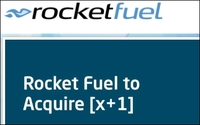Commentary
Industry Reacts To Rocket Fuel's Acquisition Of [x+1]
- by Tyler Loechner , Staff Writer @mp_tyler, August 7, 2014
 Programmatic ad
platform Rocket Fuel this week announced its intention to acquire [x+1] for roughly $230 million. [x+1] is a demand-side platform (DSP) that also has a data management platform (DMP).
Programmatic ad
platform Rocket Fuel this week announced its intention to acquire [x+1] for roughly $230 million. [x+1] is a demand-side platform (DSP) that also has a data management platform (DMP).
The deal is significant because both Rocket Fuel and [x+1] have established themselves as large players in the ad tech space. I tracked down a few people from around the industry to hear their comments.
Phil Shih, VP of platform operations at VivaKi, Publicis Groupe’s largest trading desk, sees the acquisition as “a move to combine two managed-service network models.”
He added: “[x+1] has made it a point to work directly with marketers versus through agencies, but I think they realized that agencies weren’t going away anytime soon and that they needed to redefine their model. On Rocket Fuel’s end, they wanted to leverage [x+1]’s direct client relationships.”
Rocket Fuel had to lower its revenue projections for the second half of the year, citing “tighter control of client spend by the agencies' internal trading desks and a shift toward direct licensing by advertisers” as two of the main reasons why.
Matt Sauls, VP and co-founder at SiteScout, the DSP that was acquired by Centro last year, believes the DMP that [x+1] brings to Rocket Fuel is the ace in the deal.
Sauls commented: “In an ecosystem where data costs can eat up a large percentage of digital media spend, it is no surprise that Rocket Fuel is looking to capture more share of total budgets by collecting those data fees, and the margins that go with them. With this goal in mind, an established player like [x+1] is one of the few options for mature DMP technology.”
Eric Bosco, CEO of ChoiceStream, a DSP, commented: “Rocket Fuel’s acquisition of [x+1] signals the RTB marketplace’s growing need to have integrated technical platforms that are tightly coupled together as opposed to point solutions that are cobbled together by advertisers or agencies. [x+1]’s data and campaign management platform nicely complement Rocket Fuel’s optimization technology.
“If they can pull off the integration, it should be a formidable competitor in the DSP space,” Bosco noted. “However, I know from personal experience that integrating such different platforms properly is extremely challenging, so it will be interesting to see if they can pull it off.”
Rocket Fuel plans to integrate [x+1]’s technology over the course of 2014, per its Q2 earnings report, and says it doesn’t plan to “provide separate guidance for the two entities beginning in 2015.”
Mark Glauberson, VP of media and business development at Direct Agents, commented: “With this acquisition, [Rocket Fuel] is adding a DMP, self-management capabilities and transparency to their stack. Advertisers and agencies have been dedicating more of their programmatic budget to DSPs and are moving away from exchange buying.”
And while Glauberson believes that “with [x+1], Rocket Fuel is better equipped to respond to this shift,” he agrees with Bosco that “the challenge will be bringing the two platforms together into one cohesive unit.”
Marc Poirier, co-founder and EVP of business development at Acquisio, is looking at the larger picture and believes that the acquisition is “yet another sign of the inevitable consolidation of the ad tech space, which is driven in large part by the needs of the CMO who wants to limit the number of ad tech vendors and needs better integration between all marketing channels.”
It’s true that there has been no shortage of M&A news in the ad tech space, particularly in the past month or so, in which we saw LiveRail get purchased by Facebook, SpotXchange by RTL Group, Bizo by LinkedIn, Flurry by Yahoo and more.




$230M ($100M cash + $130M stock) on $80M revs = 2.875X revs multiple, or 2.5X once FUEL's stock dive accounted for.